Is Milk Vegan?
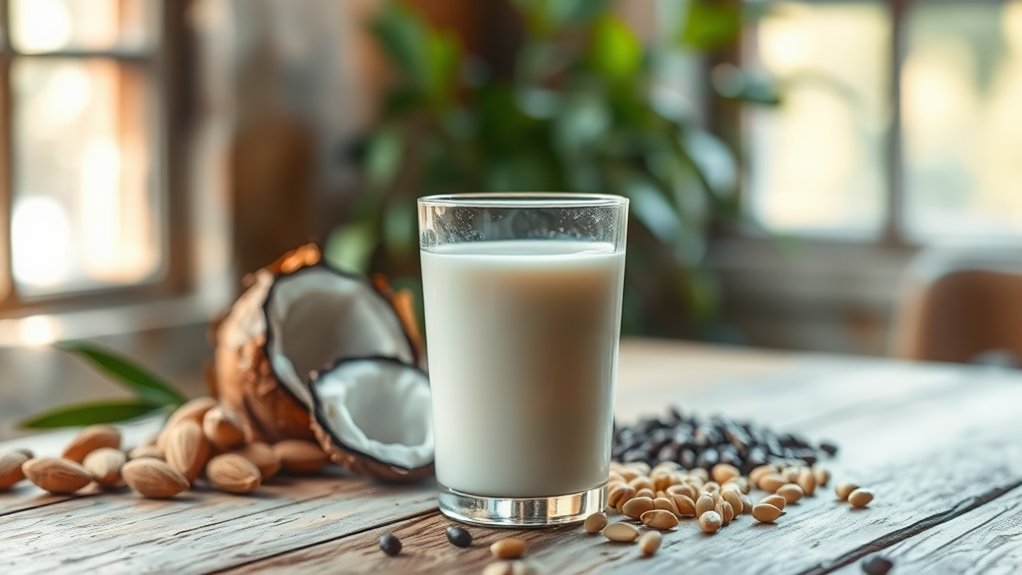
Are you wondering if milk fits into a vegan lifestyle? You’re not alone—many people are curious about what it means to choose plant-based options. Understanding the origins of milk and the practices of the dairy industry can shed light on why this topic is so important for both health and ethical reasons. It’s essential to consider how our food choices impact animals, the environment, and even our own well-being. If you’re interested in analyzing alternatives, there are a variety of delicious plant-based milk options that might be just what you’re looking for. Let’s dive deeper into this topic!
Understanding Veganism

Understanding veganism goes beyond merely adopting a diet; it represents a comprehensive lifestyle choice grounded in ethical, health, and environmental considerations. At the core of veganism is the exclusion of all animal products, including dairy, due to concerns regarding animal welfare and health implications.
Dairy production often involves practices that can lead to animal suffering, which many people find ethically concerning. Moreover, dairy farming has significant environmental impacts, contributing to greenhouse gas emissions and habitat destruction. These factors drive many individuals towards veganism as they seek more compassionate and sustainable choices.
For those pursuing a vegan lifestyle, plant-based dairy alternatives—such as almond, soy, and oat milk—provide nutritional options without the ethical issues associated with dairy. These alternatives not only support a compassionate approach but also align with the growing emphasis on sustainability in food choices.
The Nature of Dairy Milk
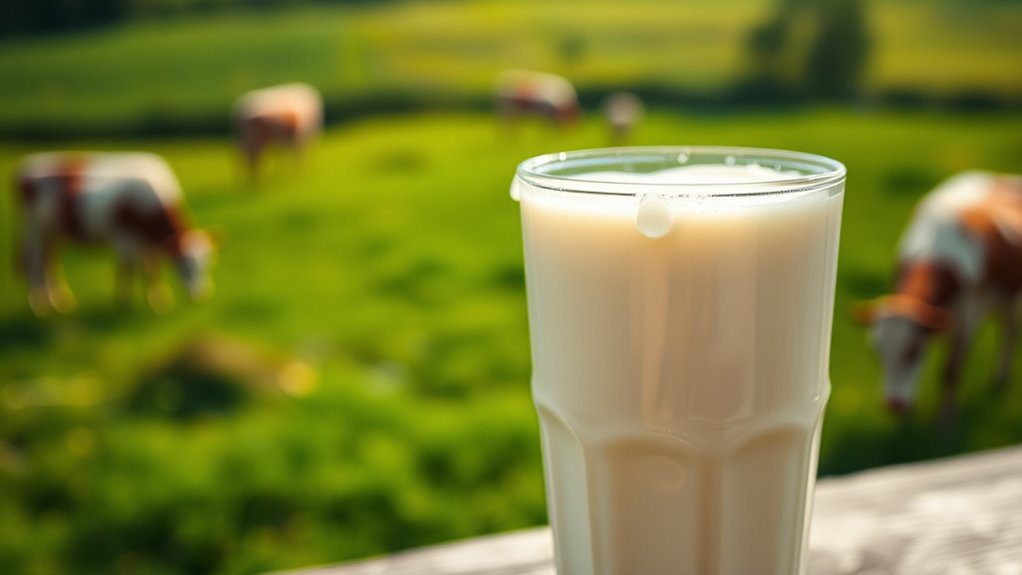
Dairy milk is a popular beverage enjoyed by many for its flavor and nutritional benefits. However, it’s important to understand its origins and production implications. Dairy milk primarily comes from cows and goats, which means it’s an animal-derived product. This contrasts with vegan principles, as consuming dairy raises ethical concerns about animal welfare.
To produce milk, female cows must give birth, often leading to practices such as artificial insemination. After birth, calves are typically separated from their mothers, prompting significant animal rights discussions. Additionally, many people experience lactose intolerance, which can lead to digestive discomfort when consuming dairy milk.
The production of dairy milk also has considerable environmental effects. Dairy farming contributes to greenhouse gas emissions and can lead to resource depletion, which raises questions about sustainability. These issues have led many individuals to reconsider their dairy consumption, particularly those following a vegan diet.
For those seeking alternatives, there are numerous vegan dairy products available on the market. These options provide similar tastes and textures without the ethical and environmental concerns associated with dairy milk.
Ethical Concerns Surrounding Dairy Farming
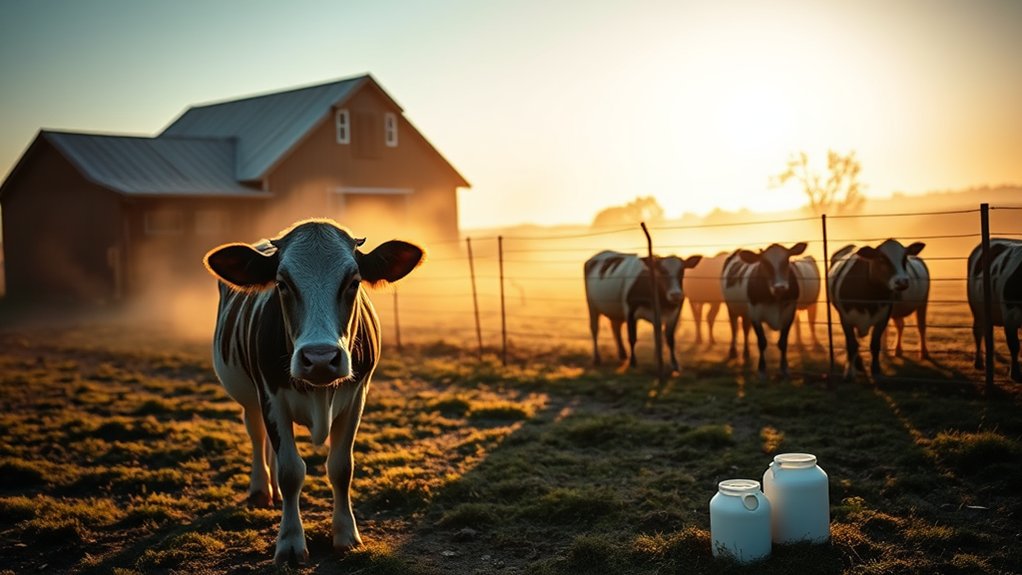
Ethical concerns in dairy farming primarily revolve around the treatment of cows and the methods used in milk production. One major issue is the use of artificial insemination, which leads to repeated pregnancies for cows. This process often results in the separation of calves from their mothers shortly after birth, causing distress for both the mother and the calf. Many animal rights advocates view this as an exploitative practice that disregards the natural bond between them.
In addition to reproductive practices, the living conditions for dairy cows can be quite concerning. Many cows are kept in cramped quarters that limit their ability to move freely and engage in natural behaviors. This confinement can negatively impact their health and overall well-being.
The use of hormones and antibiotics in the dairy industry is another ethical issue. These substances are often administered to increase milk production, which raises questions about animal welfare and the potential long-term effects on both cows and consumers.
Moreover, the environmental impact of dairy farming is significant. Dairy production contributes to greenhouse gas emissions and can lead to habitat destruction, further complicating the moral considerations surrounding dairy consumption.
Understanding these issues can help consumers make informed choices about dairy products and consider the broader implications of their dietary preferences. By raising awareness of the ethical concerns surrounding dairy farming, we can encourage a more compassionate approach to animal welfare and environmental sustainability.
Health Implications of Dairy Consumption

When thinking about dairy consumption, it’s essential to consider both the potential health risks and the nutritional benefits. For some individuals, the high saturated fat content and issues like lactose intolerance can lead to digestive discomfort and cardiovascular concerns.
However, there are plenty of plant-based alternatives that can offer the necessary nutrients without the downsides associated with dairy. Speaking of alternatives, let’s analyze some of the options available and how they can fit into a healthy lifestyle.
Health Risks of Dairy
Dairy consumption can carry several health risks that are important to consider. One major concern is its association with increased cholesterol levels, which can contribute to heart disease and other cardiovascular problems.
For individuals who are lactose intolerant, consuming dairy may lead to uncomfortable digestive issues such as bloating, gas, and diarrhea.
Another factor to keep in mind is that hormones given to cows can make their way into milk. This might disrupt your hormonal balance, potentially leading to various health issues.
Additionally, some research indicates that dairy products can have an adverse effect on mood and energy levels, resulting in fatigue and mood swings in some individuals.
The saturated fat content in many dairy products is also a consideration. Health organizations often advise limiting high-fat dairy intake to promote better heart health.
Before deciding whether to include dairy in your diet, it’s essential to weigh these risks against the potential benefits.
If you’re unsure, consulting with a healthcare professional can provide personalized guidance tailored to your dietary needs.
Nutritional Alternatives Available
When checking out nutritional alternatives to dairy, you’ll discover a range of plant-based milk options that offer essential nutrients while minimizing potential health risks linked to traditional dairy. Popular choices like almond, soy, and oat milk can provide comparable nutritional benefits, such as protein and calcium, without the drawbacks of lactose intolerance or higher cholesterol levels often associated with dairy products.
Research indicates that incorporating these plant-based milks into your diet can positively impact your overall health. For instance, they can help lower saturated fat intake, which is beneficial for heart health and may reduce the risk of chronic diseases.
Additionally, plant-based milks don’t typically carry concerns about hormone or antibiotic exposure, which can be associated with some dairy products.
By choosing these alternatives, you can enjoy health benefits while aligning your dietary choices with your values. It’s important to consider your own nutritional needs and preferences when selecting a plant-based milk, as they can vary in taste and nutrient content.
Checking out options like fortified almond milk or protein-rich soy milk can help you find the right fit for your lifestyle.
Environmental Impact of Dairy Production
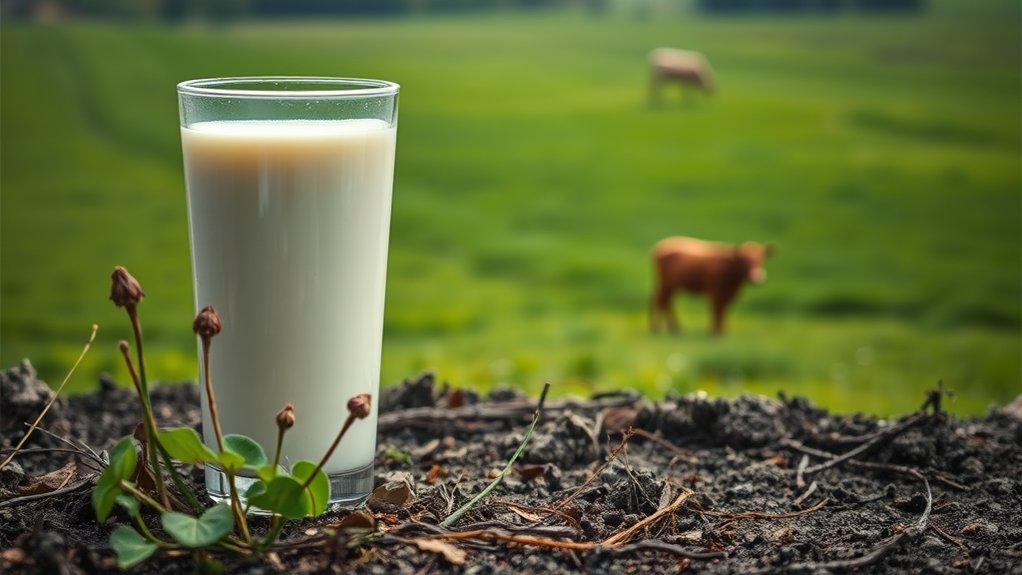
When thinking about dairy production, it’s important to acknowledge its impact on greenhouse gas emissions. For instance, methane from cows accounts for roughly 4% of global emissions.
Additionally, dairy farming can lead to habitat destruction, as land is often cleared for grazing and feed crops, which can negatively affect local ecosystems.
By cutting back on dairy consumption, you can play a part in addressing these environmental challenges and supporting more sustainable food choices.
Speaking of sustainable practices, let’s look into some alternatives that can benefit both our health and the planet.
Greenhouse Gas Emissions
Dairy production has a notable environmental impact, particularly concerning greenhouse gas emissions. It’s estimated that dairy farming contributes around 3% of global greenhouse gas emissions. This contribution primarily comes from methane, a potent greenhouse gas, which is released during the digestion process of dairy cows and from the management of their manure.
In fact, dairy cows alone are responsible for approximately 25% of methane emissions from the agricultural sector, highlighting their significant role in climate change.
Moreover, the production of dairy products is resource-intensive. For instance, producing just one gallon of milk requires about 1,000 gallons of water. This statistic underscores the substantial resources tied to animal products and raises important questions about sustainability.
To address these environmental concerns, reducing dairy consumption can be an effective way for individuals to lower their carbon footprint. By making conscious choices, such as analyzing plant-based alternatives, you can contribute to sustainability efforts.
Opting for a vegan lifestyle not only helps in reducing greenhouse gas emissions but also promotes a more sustainable future for our planet.
Understanding the impact of dairy production on greenhouse gas emissions empowers consumers to make informed decisions that align with their values and the health of the environment.
Habitat Destruction Issues
Dairy farming is a significant contributor to habitat destruction, largely due to the extensive land needed for both grazing and growing feed crops. This land clearance often results in the loss of biodiversity, as diverse natural habitats are replaced with monoculture farming practices.
The impact of dairy farming extends beyond land use; it also requires substantial water resources. For example, producing just one gallon of milk can consume about 1,000 gallons of water. This high demand for water puts additional pressure on freshwater resources and contributes to broader environmental challenges, including climate change. In fact, the livestock sector, which includes dairy farming, is responsible for approximately 14.5% of global greenhouse gas emissions.
Moreover, the practices associated with dairy farming can lead to soil degradation and erosion, diminishing the land’s capacity to support diverse ecosystems over time. The expansion of dairy operations has also been linked to deforestation in critical regions, such as the Amazon rainforest. This deforestation not only threatens local wildlife but also destabilizes global biodiversity and climate systems.
Understanding the environmental impact of dairy farming is essential for making informed choices about food consumption and sustainable agricultural practices. By being aware of these issues, we can better appreciate the importance of supporting farming methods that prioritize ecological balance and biodiversity.
Looking into Plant-Based Milk Alternatives
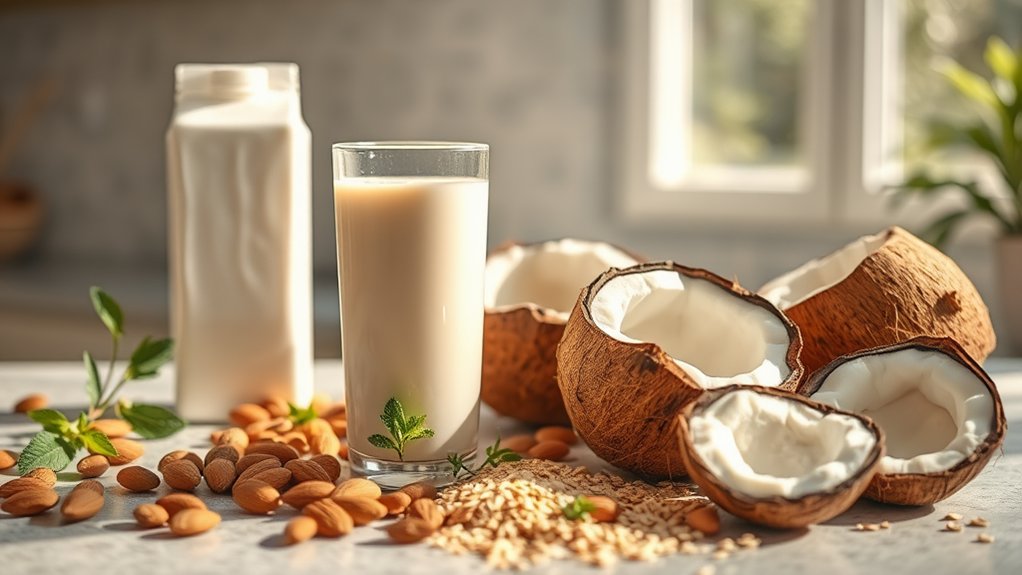
When looking into plant-based milk alternatives, you’ll discover a range of options such as almond, soy, oat, coconut, and hemp milk. Each type caters to different tastes and nutritional preferences, making them suitable for various dietary needs.
These plant-based milks serve as effective substitutes for traditional dairy products, and they come with several notable benefits.
One of the key advantages of plant-based milk alternatives is that they typically contain lower levels of saturated fats and cholesterol compared to cow’s milk. This can be beneficial for heart health, particularly for those looking to reduce their intake of these components.
Additionally, many plant-based milks are fortified with essential vitamins and minerals, such as calcium and vitamin D, which can boost their nutritional profile and help meet daily dietary requirements.
In terms of environmental impact, plant-based milk production generally requires fewer natural resources than that of dairy milk. This makes them a more sustainable choice, appealing to those who are environmentally conscious.
These alternatives are also quite versatile. You can use them for various culinary purposes, including baking, cooking, or adding them to smoothies and cereals.
Nutritional Benefits of Vegan Milk Options
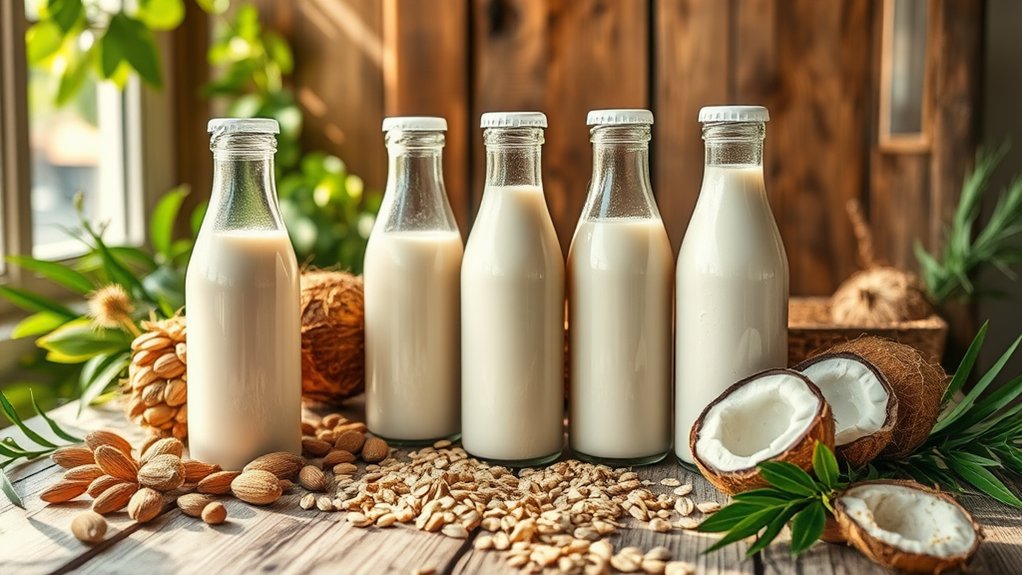
Vegan milk options offer several nutritional benefits that can positively impact your overall diet. Plant-based alternatives, such as almond and soy milk, generally have lower levels of saturated fat compared to cow’s milk, which can contribute to improved heart health.
Many of these vegan milk varieties are fortified with important nutrients like calcium and vitamin D, making them comparable to dairy in terms of nutritional value.
For example, almond milk isn’t only low in calories but also a good source of vitamin E, an antioxidant that supports skin and eye health.
On the other hand, soy milk is a complete protein, meaning it contains all the essential amino acids your body needs, making it a great choice for those looking to increase their protein intake.
Another option, oat milk, is rich in beta-glucans, a type of soluble fiber that promotes digestive health and can help lower cholesterol levels.
By incorporating these vegan milk alternatives into your diet, you can enjoy a range of health benefits while diversifying your nutrient intake.
These options can be a simple and effective way to support a healthier lifestyle.
Transitioning to a Vegan Milk Lifestyle

Transitioning to a vegan milk lifestyle can be a beneficial decision for both your health and the environment. By opting for plant-based alternatives such as almond, soy, oat, and coconut milk, you not only diversify your diet but also contribute positively to sustainability efforts.
One of the primary advantages of vegan milk options is their nutritional value. Many of these alternatives are fortified with essential nutrients like calcium and vitamin D, making them comparable to traditional dairy milk. For example, almond milk is often enriched with vitamin E, while soy milk provides a good source of protein.
Health improvements are another significant benefit of switching to vegan milk. Plant-based milks typically contain lower levels of saturated fat, which can contribute to better heart health and lower cholesterol levels. For individuals looking to manage their weight or improve their overall well-being, these alternatives can be a healthier choice.
Moreover, the environmental impact of dairy farming is substantial, contributing to greenhouse gas emissions and resource depletion. By choosing vegan milk, you can help reduce your carbon footprint and support a more sustainable food system. For instance, almond and oat milk generally require less water and land compared to cow’s milk, making them more eco-friendly options.
As you check out the variety available in vegan milk, consider how these choices align with your health goals and environmental values. Making the switch to a vegan milk lifestyle can be a straightforward process, and it opens the door to numerous delicious possibilities.
Making Informed Choices in Your Diet
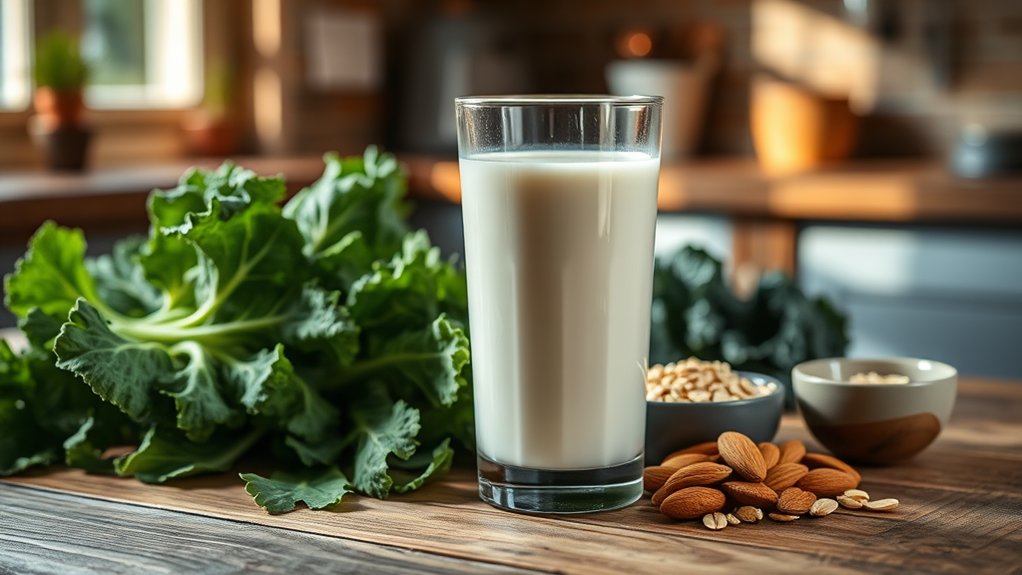
Making informed dietary choices requires a thoughtful approach that takes into account your personal values, health goals, and the broader impact of your food choices.
One important area to consider is the ethical implications of consuming dairy. Many dairy farms engage in practices that can lead to animal suffering, which can conflict with the principles of compassionate eating.
Health considerations are also crucial. For example, lactose intolerance is prevalent in many populations, and dairy consumption can contribute to promoted cholesterol levels in some individuals. By checking out plant-based alternatives, you can address these health concerns while still obtaining essential nutrients.
Additionally, the environmental impact of dairy farming can’t be overlooked. It’s a significant contributor to greenhouse gas emissions and resource depletion. Choosing plant-based options not only supports animal welfare but also aligns with a more sustainable lifestyle.
As you navigate your dietary choices, it’s important to be aware of hidden animal-derived ingredients in processed foods. This awareness can help you make informed decisions that are both health-conscious and ethical.





